Hyundai i30 Wagon vs Toyota C-HR – Which car suits you better?
Costs and Efficiency:
Price and efficiency are key factors when choosing a car – and this is often where the real differences emerge.
Hyundai i30 Wagon has a to a small extent advantage in terms of price – it starts at 24800 £, while the Toyota C-HR costs 29100 £. That’s a price difference of around 4286 £.
Fuel consumption also shows a difference: Toyota C-HR manages with 0.80 L and is therefore decisively more efficient than the Hyundai i30 Wagon with 5.70 L. The difference is about 4.90 L per 100 km.
Engine and Performance:
Power, torque and acceleration are the classic benchmarks for car enthusiasts – and here, some clear differences start to show.
When it comes to engine power, the Toyota C-HR has a distinct edge – offering 223 HP compared to 140 HP. That’s roughly 83 HP more horsepower.
In acceleration from 0 to 100 km/h, the Toyota C-HR is noticeable quicker – completing the sprint in 7.40 s, while the Hyundai i30 Wagon takes 9.80 s. That’s about 2.40 s faster.
In terms of top speed, the Hyundai i30 Wagon performs minimal better – reaching 197 km/h, while the Toyota C-HR tops out at 180 km/h. The difference is around 17 km/h.
Space and Everyday Use:
Whether family car or daily driver – which one offers more room, flexibility and comfort?
Both vehicles offer seating for 5 people.
In curb weight, Hyundai i30 Wagon is to a small extent lighter – 1316 kg compared to 1505 kg. The difference is around 189 kg.
In terms of boot space, the Hyundai i30 Wagon offers evident more room – 602 L compared to 447 L. That’s a difference of about 155 L.
In maximum load capacity, the Hyundai i30 Wagon performs distinct better – up to 1650 L, which is about 495 L more than the Toyota C-HR.
When it comes to payload, Hyundai i30 Wagon to a small extent takes the win – 524 kg compared to 425 kg. That’s a difference of about 99 kg.
Who comes out on top?
Overall, the Toyota C-HR shows itself to be dominates this comparison and secures the title of DriveDuel Champion.
It convinces with the more balanced overall package and proves to be the more versatile choice for everyday use.
Costs and Consumption
View detailed analysis
Engine and Performance
View detailed analysis
Dimensions and Body
View detailed analysis
 @ Toyota Motor Corporation
@ Toyota Motor Corporation
Toyota C-HR
Hyundai i30 Wagon
The Hyundai i30 Wagon is a practical family hauler that pairs roomy, sensible packaging with clean, modern lines and a surprisingly composed chassis. Comfortable, well-equipped and priced to make rivals sweat, it quietly ticks the boxes for daily life and weekend escapes while still managing a little grin on twisty roads.
details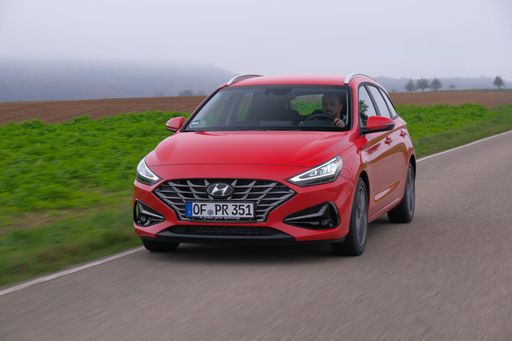 @ Hyundai Motor Company
@ Hyundai Motor Company
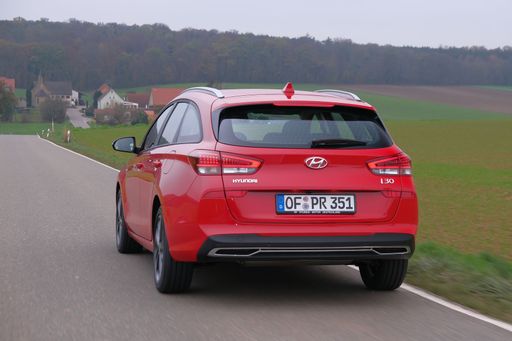 @ Hyundai Motor Company
@ Hyundai Motor Company
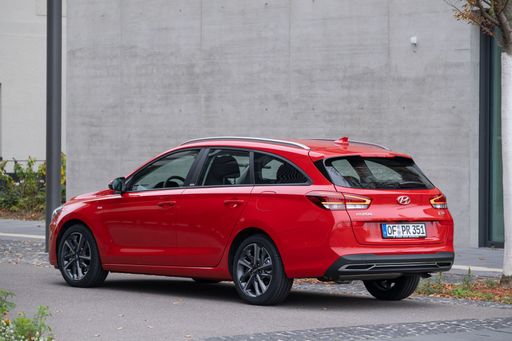 @ Hyundai Motor Company
@ Hyundai Motor Company
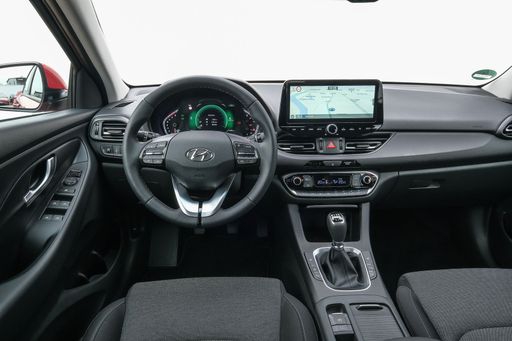 @ Hyundai Motor Company
@ Hyundai Motor Company
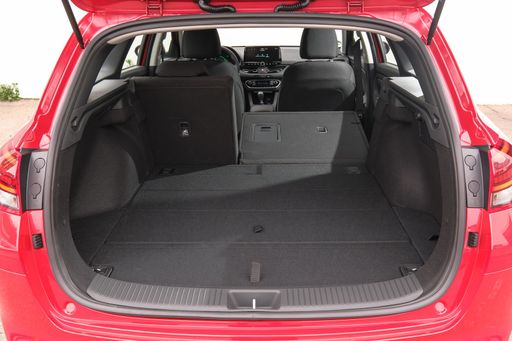 @ Hyundai Motor Company
@ Hyundai Motor Company
Toyota C-HR
The Toyota C-HR cuts a striking figure with its angular styling and coupe-like profile, so you’ll never go unnoticed in the supermarket car park. It balances everyday practicality with a nimble, city-friendly personality, making routine commutes feel a touch more fun without asking for forgiveness.
details @ Toyota Motor Corporation
@ Toyota Motor Corporation
 @ Toyota Motor Corporation
@ Toyota Motor Corporation
 @ Toyota Motor Corporation
@ Toyota Motor Corporation
 @ Toyota Motor Corporation
@ Toyota Motor Corporation
 @ Toyota Motor Corporation
@ Toyota Motor Corporation
 @ Hyundai Motor Company
@ Hyundai Motor Company
|
 @ Toyota Motor Corporation
@ Toyota Motor Corporation
|
|
|
|
Costs and Consumption |
|
|---|---|
|
Price
24800 - 30100 £
|
Price
29100 - 42800 £
|
|
Consumption L/100km
5.7 - 6 L
|
Consumption L/100km
0.8 - 5.1 L
|
|
Consumption kWh/100km
-
|
Consumption kWh/100km
-
|
|
Electric Range
-
|
Electric Range
68 km
|
|
Battery Capacity
-
|
Battery Capacity
-
|
|
co2
130 - 136 g/km
|
co2
17 - 115 g/km
|
|
Fuel tank capacity
50 L
|
Fuel tank capacity
43 L
|
Dimensions and Body |
|
|---|---|
|
Body Type
Estate
|
Body Type
SUV
|
|
Seats
5
|
Seats
5
|
|
Doors
5
|
Doors
5
|
|
Curb weight
1316 - 1461 kg
|
Curb weight
1505 - 1755 kg
|
|
Trunk capacity
602 L
|
Trunk capacity
350 - 447 L
|
|
Length
4585 mm
|
Length
4362 mm
|
|
Width
1795 mm
|
Width
1832 mm
|
|
Height
1475 mm
|
Height
1558 - 1564 mm
|
|
Max trunk capacity
1650 L
|
Max trunk capacity
1076 - 1155 L
|
|
Payload
439 - 524 kg
|
Payload
375 - 425 kg
|
Engine and Performance |
|
|---|---|
|
Engine Type
Petrol, Petrol MHEV
|
Engine Type
Full Hybrid, Plugin Hybrid
|
|
Transmission
Manuel, Automatic
|
Transmission
Automatic
|
|
Transmission Detail
Manual Gearbox, Dual-Clutch Automatic
|
Transmission Detail
CVT
|
|
Drive Type
Front-Wheel Drive
|
Drive Type
Front-Wheel Drive, All-Wheel Drive
|
|
Power HP
100 - 140 HP
|
Power HP
140 - 223 HP
|
|
Acceleration 0-100km/h
9.8 - 13.3 s
|
Acceleration 0-100km/h
7.4 - 9.9 s
|
|
Max Speed
178 - 197 km/h
|
Max Speed
175 - 180 km/h
|
|
Torque
172 - 253 Nm
|
Torque
-
|
|
Number of Cylinders
3 - 4
|
Number of Cylinders
4
|
|
Power kW
74 - 103 kW
|
Power kW
103 - 164 kW
|
|
Engine capacity
998 - 1482 cm3
|
Engine capacity
1798 - 1987 cm3
|
General |
|
|---|---|
|
Model Year
2024
|
Model Year
2024 - 2025
|
|
CO2 Efficiency Class
D, E
|
CO2 Efficiency Class
C, B
|
|
Brand
Hyundai
|
Brand
Toyota
|
What drivetrain options does the Hyundai i30 Wagon have?
Available configurations include Front-Wheel Drive.
The prices and data displayed are estimates based on German list prices and may vary by country. This information is not legally binding.
